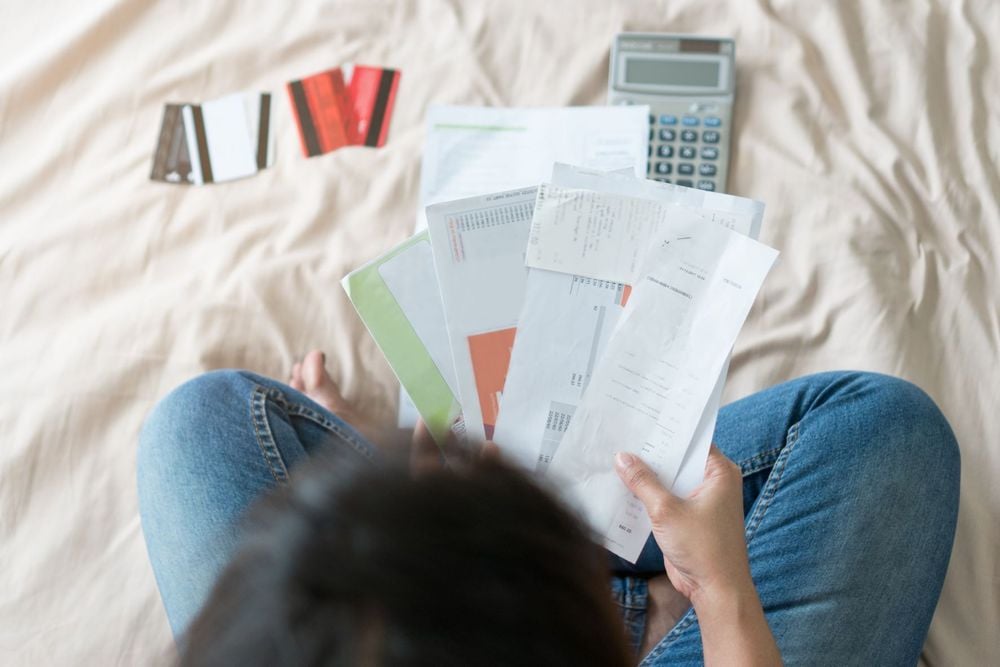This is an automatically translated article.
Worrying about money is probably a concern that no one, especially those in adulthood, has to shoulder many responsibilities in life. Sometimes, economic stress can have negative effects on physical and mental health.
1. How does money anxiety affect health?
According to some recent studies, economic or money stress can have negative effects on human health. In fact, you may feel financially stressed for various reasons such as job loss, debt, monthly living bills or other expenses in life.
Sometimes money worries can make you think or behave in ways that are contrary to your wishes. So to be able to deal with financial stress, the first thing you need to do is understand the link between it and your mental and physical health.
1.1 Effects of money anxiety on mental health When you worry about money, mental health can also be negatively impacted in a variety of ways. Feeling anxious or stressed is the leading cause of insomnia, even causing panic or obsession when you think about daily expenses.
In addition, you may also start to feel isolated, separating yourself from other relationships, including family members, because you think you do not have enough money to participate in activities with them.
Economic stress can make you feel like you're carrying the burden of money alone. This loneliness only makes things more confusing and complicated, even causing anxiety and mood swings.
In fact, there are many people in the world who are dealing with debt or have similar financial worries as you, so you are not alone. Economic. Studies also show that half of adults who are in debt tend to have mental health problems related to money anxiety.

Lo lắng về tiền bạc quá nhiều có thể ảnh hưởng tới sức khỏe tinh thần của bạn
1.2 Effect of money anxiety on physical health People with large debts or financial stress often report it has a huge impact on their physical health. When you worry about money, your body releases stress hormones like cortisol and adrenaline, which in turn leads to a host of problems:
High blood pressure. Heart rhythm disturbances. Impaired immune system function. Weight gain or loss. Memory decline . Negative effects on mood. To prevent the effects of money anxiety on your physical and mental health, you need to take appropriate and timely countermeasures.
2. How to worry less about money?
You can completely get rid of money worries in a few ways:
Learn how to manage your personal finances The first thing you can do to relieve your financial stress is to get in solve the root of the problem. Ask yourself what is causing you financial trouble. Does the money stress stem from work, debt, low income, or day-to-day living expenses? Once you've identified the source of the problem, you can create an effective personal financial management plan.
Taking control of your personal finances starts with setting a specific budget. You can do this by making a list that includes all your monthly expenses and the average cost for each. Through that, you can see very clearly and unambiguously the amount of money you use in each month.
Some financial experts also recommend that everyone use the 50/20/30 rule when budgeting. This means 50% of your monthly salary will go towards mandatory expenses like rent, insurance and bills. 20% will be transferred to your savings account and the remaining 30% will be used for expenses for entertainment and entertainment needs.
If debt is part of your money worries, it's best to have a plan to help reduce late fees and penalties. If you find your budget can't cover the payments, it's time to contact your lender and negotiate the best settlement for both parties.

Học cách quản lý tài chính cá nhân giúp bạn hạn chế căng thẳng vì kinh tế
Coping with economic stress Once you have a detailed plan for personal financial management, the next thing is to find ways to deal with your stress. You should try to maintain healthy daily habits, including eating well, getting regular physical activity, and getting enough sleep.
Besides, you should also focus on adding healthy foods to nourish the body, avoid looking to stimulants like alcohol to deal with stress. When people worry about money, they sometimes tend to abuse alcohol. In fact, this is only a temporary solution, not only does not help but also harms health in the long run.
To help calm your mind, you can try some relaxation techniques like meditation or yoga. These activities are great for your body and mind, and can help reduce the health consequences of stress or money worries.
In addition, you should also share with loved ones about the financial worries you are facing. This will help you get a lot of emotional support from people you trust and feel like you don't have to go through the anxiety of being alone.
Get Financial Help Another way to ease your money worries is to seek out a financial professional. There are many organizations today that offer free financial advice, helping you get expert opinions as well as advice on how to manage your personal finances. A professional financial advisor will help you create a reasonable budget or necessary plans so that you can stick to it.
Financial worries – When to see a doctor? Most people who experience emotional economic stress can figure it out on their own after a few days or weeks, and then accept the challenge.
However, you should see a psychologist or GP if you find yourself constantly in a state of anxiety, restlessness and low spirits after many consecutive weeks. Your doctor can advise you on some psychotherapy methods to help you reduce your anxiety. In particular, you need to seek medical help immediately if you feel you cannot continue to cope or have negative thoughts such as suicide.
Please dial HOTLINE for more information or register for an appointment HERE. Download MyVinmec app to make appointments faster and to manage your bookings easily.
Reference source: webmd.com - nhs.uk - cnbc.com












